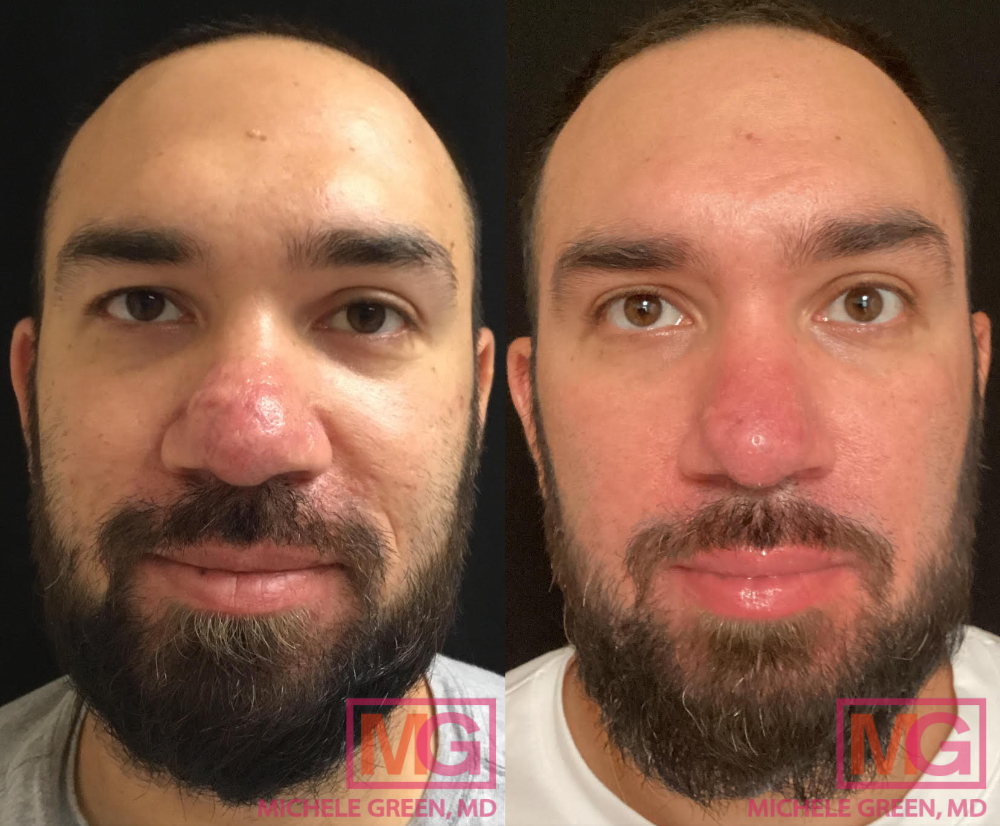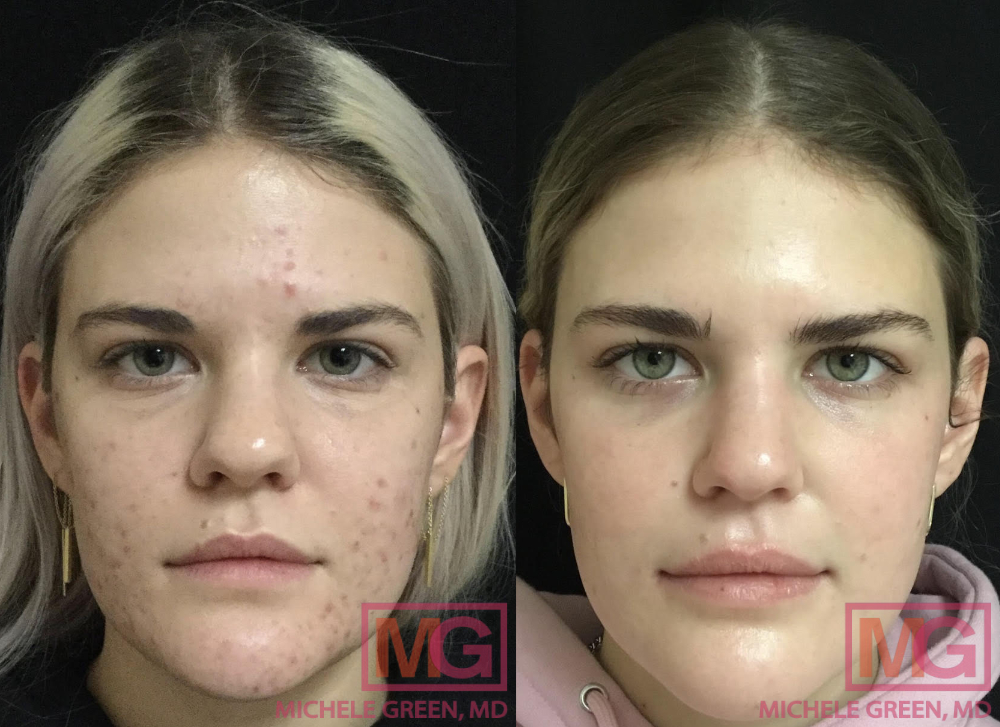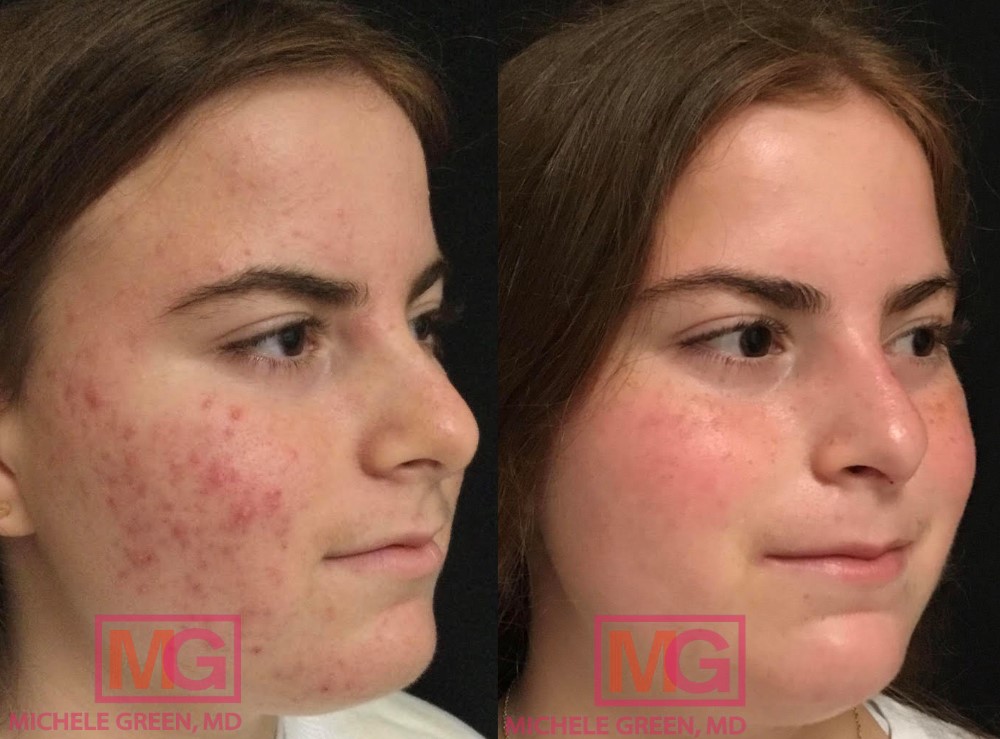Is Accutane Safe?
More than 50 million Americans suffer from acne breakouts, making acne vulgaris the most common skin condition in the United States. While many acne treatment options are available, some acne breakouts resist standard, over-the-counter treatment methods, particularly cystic acne, nodular acne, and pimples, which can remain red, swollen, and tender, leading to the formation of acne scars. Not only can these persistent, swollen pimples be painful and uncomfortable, but they can also cause embarrassment or emotional distress in patients, leading patients to wonder if there are any treatments available that can eliminate signs of severe acne vulgaris. When suffering from this kind of severe acne, it is best to seek treatment from a board-certified dermatologist, such as Dr. Michele Green in NYC, who can prescribe the isotretinoin-based medication, Accutane.
Accutane is a brand name for isotretinoin, which is a form of retinoid that is highly effective at curing even the most stubborn, severe breakouts of acne vulgaris, and preventing the formation of acne scars. Isotretinoin treatment is extremely effective for patients whose acne did not respond to topical creams or other oral medications, providing patients with long-lasting clear skin in 4-6 months. Isotretinoin is a powerful drug, which is only available when prescribed by a healthcare provider or dermatologist, such as Dr. Green, and monitored every month to assess the potential side effects, causing many people to wonder: is Accutane truly safe? However, while patients are likely to experience some of the most common side effects while on the medication, such as dry skin or dry eyes, the risk of developing serious side effects is quite low – with only 1 in 500 patients experiencing serious adverse events. Additionally, per the US Food and Drug Administration’s (FDA) medication guide, patients receiving isotretinoin treatment must attend a monthly check-up with a blood test to continue the treatment regimen – guidelines put in place to ensure the continued safety of patients taking Accutane.
Expert, board-certified dermatologist, Dr. Michele Green, has been safely prescribing Accutane at her New York City Upper East Side dermatology office for years. Always cautious of her patients’ safety, Dr. Green takes the time to review each patient’s individual medical history before recommending any cosmetic or medical treatment. Dr. Green has a wide range of skincare and medical treatments available in her office, including her proprietary MGSKINLABs product line, which produces many different creams and serums to keep the skin looking clear, bright, and youthful. Lauded for her consistently high standards of practice and high patient satisfaction, Dr. Green has been voted one of the best healthcare providers in New York City by such publications as New York Magazine, Super Doctors, and Castle Connolly.
What is Isotretinion medication?
Accutane is a powerful medication and the most effective way to treat severe acne cysts. Accutane is the brand name for isotretinoin and was originally produced by the pharmaceutical company, Roche, based out of Switzerland, until 2009. Other generic brand names for isotretinoin are available today, including Absorica, Amnesteem, Claravis, Myorisan, and Zenatane. Isotretinoin belongs to a class of medications known as retinoids and is derived from vitamin A. Accutane should only be taken when prescribed by a healthcare professional, as the possible side effects of isotretinoin have the potential to be severe and permanently harmful. When patients are prescribed isotretinoin, they must also register for the iPLEDGE program, in which all patients receive a monthly blood test and female patients of childbearing age receive a monthly pregnancy test, to monitor the effects of the drug on the body and prevent any serious birth defects.
What is Accutane used for?
Accutane is FDA-approved to treat forms of severe acne and is the ideal treatment for acne that has not responded to other forms of treatment. One of the most common forms of severe acne is nodular acne, which manifests as swollen, red, inflamed, and painful bumps that form on the surface of the skin. Acne breakouts are caused when the pores on the skin become clogged with natural oil, known as sebum, and dead skin cells, and can become infected and inflamed when bacteria are trapped inside the pores. These bacteria-infected pimples can form nodules or cysts on the surface of the skin, which can lead to unsightly bumps and acne scarring. When these pimples do not respond to oral or topical antibiotics, isotretinoin treatment is the best option to eliminate severe acne breakouts.
While the exact mechanisms through which Accutane works are still being studied, researchers understand how the effects of the treatment reduce the appearance of severe acne. To start, Accutane works to destroy the sebaceous glands that produce excess sebum and limits skin cell production in the pores, which helps to control the amount of oil on the skin and prevent the pores from clogging with sebum and dead skin cells. Additionally, isotretinoin changes the ecology of the skin, eliminating the acne-causing bacteria that are found on the skin, which reduces inflammation in the pores. The decreased oil production and elimination of acne-causing bacteria occur everywhere on the body, making Accutane effective for eliminating acne vulgaris found on the face, chest, back, and arms.
Should I use Accutane for my acne?
Accutane is a highly effective treatment for the most severe forms of acne, including cystic acne and nodular acne, that can be used to eliminate breakouts when all other forms of treatment have been ineffective. When looking for Accutane treatment, it is important to first seek out medical advice to determine if isotretinoin is the best option for you. With several potential side effects, patients on Accutane must be monitored to ensure that the risk of adverse events is as low as possible. Due to the highly regulated nature of the medication, the treatment process is quite safe with stunning results. 95% of patients see a decrease in severe acne within the first six months of treatment, and 50% of patients who underwent the full Accutane regimen report not needing to seek acne treatment again.

Is Accutane safe?
Accutane is a powerful medication that works wonders to cure the most persistent forms of acne vulgaris, severe acne that cannot be treated using any other method. Due to the intense nature of the drug, patients taking Accutane are monitored every month to ensure that they are experiencing no adverse events or serious side effects. When a patient is prescribed Accutane, they must register for the iPLEDGE program, which helps providers to keep their patients safe. Isotretinoin is associated with severe birth defects, and, as such, healthcare providers need to ensure that female patients of childbearing age are not pregnant or breastfeeding when taking Accutane. The iPLEDGE program requires female patients to take monthly pregnancy tests and use two forms of birth control for the duration of the treatment process. Further, the program requires monthly blood tests for all patients to check that the liver is functioning properly while on the drug. With these protective measures in place, Accutane is made safer for all patients.
Is isotretinoin safe?
Isotretinoin, the generic name for Accutane, is safe and effective when taken at the correct dosage and monitored by your provider or healthcare professional. A vitamin A derivative and form of retinoid, isotretinoin has been shown to have serious side effects for 1 out of every 500 patients taking the medication and can cause serious birth defects in 35% of infants exposed to isotretinoin during pregnancy. Isotretinoin can also interact poorly with certain other medications, including tetracycline antibiotics, vitamin A, progesterone-only birth control pills, the herbal supplement, St. John’s Wort, and steroid medication. Before undergoing isotretinoin treatment, it is important to consult with a medical professional, such as Dr. Green, who can determine if isotretinoin is safe and right for you.
What are the side effects of Isotretinoin (Accutane)?
Accutane is a powerful medication that is associated with potential side effects. The vast majority of patients who take Accutane for severe acne only experience mild side effects that may cause some discomfort but can be relatively easily addressed and do not cause any lasting damage to the body. The most common side effects of isotretinoin include:
- Chapped lips and dry mouth
- Dry skin or general dryness
- Itchiness
- Dry nose and nosebleeds
- Dry eyes or trouble with night vision
- Joint pain
- Rash or skin infection
- Thinning hair
- Increased sun sensitivity
- Yellowing of the eyes or skin
The most common of these side effects include chapped lips (90% of users), dry skin (80% of users), light nosebleeds (80% of users), dry eyes (40% of users), and joint pain (15% of users). For dry skin, Dr. Green recommends the use of a gentle moisturizer throughout the Accutane treatment regimen, and for sun sensitivity, Dr. Green advises patients to wear sunscreen of SPF 30 or higher whenever they go outside when the sun is at its most intense. There are risks of more severe side effects associated with Accutane treatment but they are very rare. Only 1 in 500 patients experience severe side effects and generally, any lasting damage can be avoided if the dosage of the drug is decreased or treatment stops altogether. More serious side effects of Accutane include:
- Inflammatory bowel diseases, such as Crohn’s disease or ulcerative colitis
- Mental health problems, including psychosis, new or worsening depression, or suicidal thoughts
- Erectile dysfunction and loss of libido
- Changes in blood sugar, triglycerides, or cholesterol
- Pancreas inflammation
- Headaches
- Nervous system changes, such as drowsiness, dizziness, or blurred vision
Accutane has been shown to increase the risk of birth defects, including premature birth, and physical malformities. As such, Accutane is strictly forbidden for patients who are pregnant, looking to become pregnant, or breastfeeding.
Is Accutane safe for males?
For anyone undergoing treatment with the Accutane medication, there is some risk of potential side effects, and the most common side effect for any person taking isotretinoin is dryness, specifically dry skin, dry eyes, or dry nose that can manifest as nosebleeds. More serious side effects can range from gastrointestinal diseases to mental health problems, and nervous system side effects, such as headaches, drowsiness, and dizziness. A potential side effect that can affect males specifically is erectile dysfunction. If you experience any significant side effects from Accutane treatment, tell your healthcare provider immediately.
Is Accutane safe for my teenager?
Before embarking on Accutane treatment for a teenager, it is important to fully evaluate the patient’s situation and see if any other treatment solutions are possible. While Accutane has been proven to be effective for teenage patients, younger patients are more likely to relapse into future acne breakouts than older patients. If this is the case, patients may require a low dose of Accutane to maintain the results of the treatment. It is also important to consider if the teenager in question has finished growing, as isotretinoin has the potential to slow bone growth in teenagers who have not finished growing.

Is Accutane safe for females?
Providers are very careful about prescribing Accutane to females of childbearing age, as there is a risk of severe birth defects for pregnant women. While Accutane is safe and effective for females themselves, healthcare providers take extra care to ensure that females are not pregnant while undergoing Accutane treatment. For that reason, all female patients of childbearing age are required to take two negative pregnancy tests before Accutane can be prescribed, and as part of the iPLEDGE program, females are required to take a monthly pregnancy test before receiving the next month’s prescription.
Is isotretinoin safe in pregnancy?
No. Isotretinoin is not safe to take during pregnancy and can cause serious birth defects in the fetus. For the general population, the risk of birth defects is between 3 and 5%, however, for babies born to mothers taking Accutane, the risk of birth defects was 35%, demonstrating the incredible risk involved in undergoing isotretinoin treatment during pregnancy. Serious birth defects associated with Accutane treatment include:
- Heart deformities
- Head deformities, including small ears and a small jaw
- Vision or hearing impairment
- Cleft palate
- Fluid surrounding the brain
- An absent or small thymus gland
The iPLEDGE program works to ensure the safety of mothers and babies when taking Accutane. Females of childbearing age, which make up approximately 50% of all Accutane users, must agree to monthly pregnancy tests and to use two forms of birth control while taking isotretinoin. Patients should wait for at least a month after finishing the Accutane course before attempting to get pregnant. These medical guidelines help to keep patients safe during treatment.
Why was Accutane considered dangerous?
Accutane is an oral medication that works to eliminate severe acne by causing a reduction in sebum production and eliminating the bacteria on the skin that are responsible for acne vulgaris. The drug works throughout the whole body, curing acne on the face, back, chest, and arms. While several side effects are associated with isotretinoin treatment, recent research has demonstrated that the mental health problems and gastrointestinal diseases that were believed to be associated with the drug may not be caused by Accutane. It was previously believed that Accutane caused an increase in depression, psychosis, and suicidal thoughts, but according to studies published in the Journal of American Dermatology in 2017 and the British Medical Journal in 2019, there is no evidence to suggest that Accutane causes an increase in these mental health problems. The 2019 study showed that many patients reported an improvement in depression after beginning the Accutane treatment. Similarly, a comprehensive study published in the European Journal of Gastroenterology and Hepatology demonstrated that the rates of gastrointestinal disease among those taking Accutane were not significantly higher than those of the general population, leading researchers to conclude that increased GI distress is not expressly caused by Accutane treatment.
Is Accutane banned in the US?
No! Accutane is an FDA-approved treatment for severe acne and is available in the United States for patients who receive a prescription from their healthcare provider, and is therefore, not banned in the United States. When a drug receives FDA approval, it means that it has undergone significant clinical trials to determine if the treatment is safe and effective for its intended treatment, and Accutane has been demonstrated to be the most effective treatment for severe acne breakouts. The FDA has also mandated that patients register for the iPLEDGE program to ensure that female patients of childbearing age do not become pregnant and that all patients’ liver is functioning properly. This safety measure ensures that patients in the United States are safe.
Is Accutane worth the risk?
Accutane is the most effective treatment out there for curing the most severe and persistent forms of acne vulgaris and preventing the formation of acne scars. The risk of developing severe side effects is very low – with only 1 in 500 patients experiencing serious adverse events – and the potential benefits of the treatment are very high, especially for those who have found that no other treatments are effective. The American Osteopathic College of Dermatology found that the majority of patients who undergo Accutane treatment do not require any further acne treatment going forward, meaning that Accutane is a permanent acne cure for as many as 50% of patients. With only one round of treatment, 95% of patients will see their acne completely cleared after four to six months, and of the 5% who require a second round of treatment, 50% of those patients will see their acne completely cleared after a second round of treatment. For many patients, Accutane treatment provided them with clear skin they never thought would be attainable, making the treatment completely worth it.

How do I get started with Accutane treatment today?
Breakouts of persistent or severe acne can be physically scarring and emotionally distressing. For many, a trial-and-error approach to cystic acne treatment with over-the-counter skin care products can result in feelings of frustration. If you are bothered by breakouts of pimples that have not responded well to other acne treatments, isotretinoin treatment with a healthcare professional, such as Dr. Michele Green in NYC, may be the solution for you. Isotretinoin, known by the popular brand name Accutane, is an FDA-approved oral medication for acne vulgaris that is derived from vitamin A. Accutane is known as the best cure for acne, with 95% of Accutane patients achieving clear skin that is free from acne breakouts. Although Accutane treatment used to be reserved for cases of severe acne and cystic acne, it is now recommended as a safe and effective acne treatment for many different types of acne breakouts.
Dr. Michele Green is an internationally renowned board-certified dermatologist with over two and a half decades of experience providing her patients from around the world with the best treatment options available, including for active breakouts of acne and acne scars. For her dedication to her patients and expertise, Dr. Green is consistently recognized as one of New York’s best dermatologists by Castle Connolly, New York Magazine, and Super Doctors. When you consult with Dr. Green at her private dermatology office in Manhattan’s Upper East Side neighborhood, she will work with you to determine the underlying causes of your breakouts and develop a personalized acne treatment plan best suited to your specific needs. Please call us at 212-535-3088 or contact us online today to schedule a consultation with Dr. Michele Green and discover if Accutane is the best treatment for you.
 212-535-3088
212-535-3088